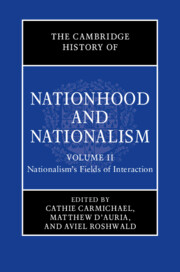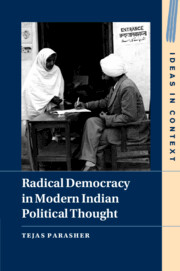Refine search
Actions for selected content:
43 results
4 - Assemblages of Inequalities and Resilience Ideologies in Urban Planning
-
-
- Book:
- Racial Justice in American Land Use
- Published online:
- 19 September 2025
- Print publication:
- 09 October 2025, pp 99-123
-
- Chapter
- Export citation
4 - Asian Outcasts
-
- Book:
- Armed Internationalists
- Published online:
- 19 September 2025
- Print publication:
- 09 October 2025, pp 97-136
-
- Chapter
- Export citation
Pan-African Print in Interwar Britain: Ras T. Makonnen and International African Opinion
-
- Journal:
- Transactions of the Royal Historical Society , First View
- Published online by Cambridge University Press:
- 27 August 2025, pp. 1-24
-
- Article
-
- You have access
- Open access
- HTML
- Export citation
Underground Revolutionaries: The PAIGC, Leninism, and the Decolonization of Cabo Verde
-
- Journal:
- African Studies Review , First View
- Published online by Cambridge University Press:
- 15 August 2025, pp. 1-22
-
- Article
-
- You have access
- Open access
- HTML
- Export citation
‘Down with neocolonialism!’ Strategic narrative resurgence and foreign policy preferences in wartime Russia
-
- Journal:
- European Journal of International Security , First View
- Published online by Cambridge University Press:
- 31 July 2025, pp. 1-22
-
- Article
-
- You have access
- Open access
- HTML
- Export citation
The (third) world of yesterday: Global anti-colonial struggles, Palestinian consciousness, and Zionist-colonial alliances
-
- Journal:
- Journal of Global History , First View
- Published online by Cambridge University Press:
- 03 June 2025, pp. 1-20
-
- Article
-
- You have access
- Open access
- HTML
- Export citation
7 - The British Imperium
- from III - 1885–1931: The Crises of Liberalism
-
- Book:
- Modern Britain, 1750 to the Present
- Published online:
- 14 January 2025
- Print publication:
- 30 January 2025, pp 227-265
-
- Chapter
- Export citation
11 - Social Democracy and the Cold War
- from IV - 1931–76: Society Triumphant
-
- Book:
- Modern Britain, 1750 to the Present
- Published online:
- 14 January 2025
- Print publication:
- 30 January 2025, pp 396-434
-
- Chapter
- Export citation
13 - The Sexual Revolution
-
-
- Book:
- The Cambridge World History of Sexualities
- Published online:
- 26 April 2024
- Print publication:
- 16 May 2024, pp 275-296
-
- Chapter
- Export citation
The terrestrial trap: International Relations beyond Earth
-
- Journal:
- Review of International Studies / Volume 50 / Issue 3 / May 2024
- Published online by Cambridge University Press:
- 06 May 2024, pp. 600-618
- Print publication:
- May 2024
-
- Article
-
- You have access
- Open access
- HTML
- Export citation
Riotous Lives and Subversive Literatures: New Directions in Global Histories of Resistance
-
- Journal:
- Itinerario / Volume 48 / Issue 1 / April 2024
- Published online by Cambridge University Press:
- 05 February 2024, pp. 98-109
-
- Article
-
- You have access
- Open access
- HTML
- Export citation
13 - African Nationalisms
- from Part I - Imperial and Postcolonial Settings
-
-
- Book:
- The Cambridge History of Nationhood and Nationalism
- Published online:
- 08 November 2023
- Print publication:
- 09 November 2023, pp 280-299
-
- Chapter
- Export citation

The Cambridge History of Nationhood and Nationalism
-
- Published online:
- 08 November 2023
- Print publication:
- 09 November 2023
Three meanings of colonialism: Nehru, Sukarno, and Kotelawala debate the future of the Third World Movement (1954-61)
-
- Journal:
- Journal of Global History / Volume 19 / Issue 1 / March 2024
- Published online by Cambridge University Press:
- 25 July 2023, pp. 118-134
-
- Article
-
- You have access
- Open access
- HTML
- Export citation
4 - “A Living Union”
-
- Book:
- Radical Democracy in Modern Indian Political Thought
- Published online:
- 06 July 2023
- Print publication:
- 20 July 2023, pp 93-120
-
- Chapter
- Export citation

Radical Democracy in Modern Indian Political Thought
-
- Published online:
- 06 July 2023
- Print publication:
- 20 July 2023
4 - Empire and the World Wars: 1914–45
-
- Book:
- French Colonialism
- Published online:
- 23 June 2023
- Print publication:
- 06 July 2023, pp 105-140
-
- Chapter
- Export citation
14 - The Paris Peace Conference and the Origins of Global Feminism
- from Part III - Actors and Networks
-
-
- Book:
- Peacemaking and International Order after the First World War
- Published online:
- 18 May 2023
- Print publication:
- 01 June 2023, pp 337-360
-
- Chapter
- Export citation
15 - Colonial Nationalists and the Making of a New International Order
- from Part III - Actors and Networks
-
-
- Book:
- Peacemaking and International Order after the First World War
- Published online:
- 18 May 2023
- Print publication:
- 01 June 2023, pp 361-378
-
- Chapter
- Export citation
13 - ‘British We Are and British We Stay’: Troubles
- from Part III - Repercussions
-
- Book:
- Untied Kingdom
- Published online:
- 16 February 2023
- Print publication:
- 16 February 2023, pp 380-412
-
- Chapter
- Export citation
